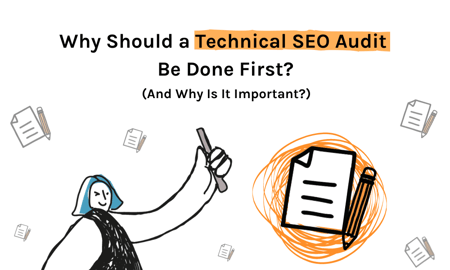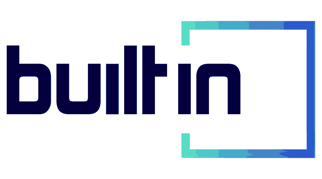Why Should a Technical SEO Audit Be Done First & Why Is It Important?
February 02, 2023
5 Minute Read

When kicking-off a new engagement with a SEO agency, you might want to jump straight into the fancy stuff – keyword optimization, blog content, and competing in the SERPs with your top competitors. However, if you start with those things without forming a strong technical foundation first, it would be akin to buying a fixer upper house and only making the outside look pretty. In this case, the foundation and internals (technical SEO) were never addressed, and you wouldn’t be able to live in the house for very long without something going wrong. Don’t care for analogies? We got you covered with all the technical SEO jargon below to help understand just how important it is to begin with a full technical SEO audit at the start of a new client engagement.
Order of Operations – Why Technical SEO First?
One of the greats in SEO, Stephan Spencer, advocated in his book “The Art of SEO” that SEO is a combination of art and science. Well, technical SEO is the scientific part. It is more cut and dry than other elements like keyword intent and competition, and forms the basis for all other SEO enhancements to your website. A technical SEO audit covers a variety of main areas including security and crawlability (XML sitemap, robots.txt, SSL), site speed (core web vitals), and metadata (title tags, H1s, and meta descriptions).
Technical SEO is the fuel that helps more artistic and nuanced SEO strategies flourish. The first question we ask new clients is if they have done a technical audit in the past, and if so, when the last one was conducted. Chances are, even if one was done 6 months ago, we are still going to conduct an audit before anything else. Depending on how much your website changes throughout the year, it is also a good idea to do technical audits quarterly, or at the very least bi-annually. The good news is once the first one is completed (which often uncovers the most issues), the ongoing audits in theory should result in maintenance and upkeep with relatively little changes needed.
More elements are covered in our technical audits than listed above, some of which you can check out in our deep dive on technical SEO. However, here we will primarily explore the importance of placing technical SEO first as it relates to the following technical SEO factors.
Security (Secure Sockets Layer – SSL)
If your site does not have a SSL license (think padlock icon in your browser URL bar), you are losing traction. Search engines favor sites that are secure, and will show secure sites with proper SSL licenses over ones without. If this is an issue, fixing this helps you get over the first hurdle.
Website Crawlability
A search engine crawler’s ability to access your site is dictated by technical SEO. If not optimized from the beginning, users could experience pages with errors, broken links, or not even see your website listed in the search results at all. To further illustrate how this is important, let’s follow our recurring theme of the desire to implement keywords on our site before doing anything else. You could optimize a page with your new keywords, only to find that the entire section of the site you are optimizing is not crawlable, and not being indexed on search results pages. There are a couple of specific crawlability factors we can look at to illustrate this further.
Crawlability – Robots.txt File
The robots.txt file is the first place search engines arrive when crawling your site. It serves as a directive of “allow” and “disallow” statements telling the crawlers what pages they can and cannot access. This is your chance to limit crawling to areas of the site like admin, customer accounts, and other areas of the site that are not customer facing. Going back to our house analogy, a house with no robots file would allow house guests to access every room of your house immediately – as opposed to one WITH a robots file where doors to bedrooms would be closed.
Without optimizing your robots file, crawlers can access every single URL on your site, which could result in unintended pages being indexed, or search engine crawlers not finishing their crawl due to running out of crawl budget. By tackling this element immediately you are able to herd search engine crawlers and keep them focused on the areas of the site you want them to crawl.
Crawlability – Sitemap.xml File
Similar to the robots file, your sitemap.xml serves as an important initial step to button up technical SEO. The sitemap.xml file should be submitted in Google Search Console, and should be linked at the bottom of your robots file as an additional way for crawlers to locate it. It is essentially a list of URLs served to crawlers on a silver platter. Without one, crawlers have free reign of your site, and can index pages in the search engines with errors (404, 503, etc). Optimizing this and ensuring it contains only live, forward facing 200 status code URLs immediately helps further focus crawlers attention to only the pages you want indexed in the search results.
Site Speed – Core Web Vitals
The SEO world moves quickly to adjust to Google and other search engine’s constantly changing algorithms. One perfect example of such changes is site speed, or specifically the Core Web Vitals which are 3 specific site speed elements that affect rankings. Ever since site speed became a ranking factor that affects your relative position in the search results, it became paramount in our technical audits.
If you do not attempt to tackle site speed issues head on from the beginning, you could be spinning your wheels trying to rank for keywords. If your page or site is very slow, chances are your competitors will rank higher than you. Get technical with your site speed and it could do wonders for your placement in the search results.
Metadata
Metadata primarily refers to your individual pages’ title tags, H1 headers, and meta descriptions. We typically look for missing, duplicate, or high character count metadata. Although we typically revisit most of your site’s metadata after we do keyword research and mapping, an initial scan is important to see if you are missing anything that could be easily fixed immediately.
For example, maybe your site is ecommerce, and all of your product pages have the same title tag “Shop Products – eCommerce Company”. A technical SEO audit can identify this and we could propose a somewhat immediate taxonomy change to “Product Name – eCommerce Company” that would immediately give you a boost in the search results.
Technical Findings = Strategy
In conclusion, technical SEO uncovers things under the surface that are not apparent at first glance. It can help explain a number of things like “why are my service pages not appearing in the search results?” or “why do every one of my products appear to have the exact same title in the search results?”.
This is why BFO does a technical audit first. It helps put our best foot forward for all future SEO enhancements. More importantly, our technical audit findings lead to strategic decisions for our ongoing clients. It may be that you are missing structured data (schema) on your product pages and you are an ecommerce company. This would be a top priority to fix, and the technical audit made it possible for us to find that issue and prioritize it in our yearly strategy.
To get your technical SEO audited and begin an effective SEO strategy for your website, connect with BFO today and get the conversation going.

Jon Pappas
Jonathon is the Director of Organic Search at BFO. He’s a reliable and consistent member of our team and is very detail-oriented and client-focused.
CATEGORIES
SUBSCRIBE TO OUR BLOG
Stay up to date with the latest industry best practices in digital marketing!























.png?width=339&height=179&name=Webinar%20Banner%20(1).png)



.png?width=339&height=179&name=July%20Webinar%20(Newsletter).png)

.png?width=339&height=179&name=Webinar%20Banner-April-02%20(1).png)
%20(4).png?width=339&height=179&name=Webinar%20Banner-May-02%20(1)%20(4).png)




.png?width=339&height=179&name=March%202023%20Webinar%20Ad%20(autoresponder).png)










.png?width=339&height=179&name=2025%20Paid%20Media%20(1200%20x%20628%20px).png)





















































.png?width=339&height=179&name=2026%20Paid%20Media%20Ad%20Specs%20(Twitter%20Post).png)

